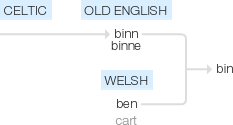Bin
Old English bin(n), binne, of Celtic origin; related to Welsh ben ‘cart’. The original meaning was ‘receptacle’ in a general sense; also ‘a receptacle for provender in a stable’ and ‘container for grain, bread, or other foodstuffs’. The sense ‘receptacle for rubbish’ dates from the mid 19th century.
wiktionary
From Middle English binne, from Old English binne(“crib, manger”), from Proto-West Germanic[Term?], from Gaulish benna(“four-wheeled cart; caisson”) (compare Old Irish buinne, Welsh benn(“cart”), Old Breton benn(“caisson”)).
From Arabic بِن (bin, “son”).
Contraction of being
Contraction of been
Clipping of binary.
etymonline
bin (n.)
"enclosed receptacle for some commodity," Old English binne "basket, manger, crib," a word of uncertain origin. Probably from Gaulish, from Old Celtic *benna, and akin to Welsh benn "a cart," especially one with a woven wicker body. The same Celtic word seems to be preserved in Italian benna "dung cart," French benne "grape-gatherer's creel," Dutch benne "large basket," all of which are from Late Latin benna "cart," Medieval Latin benna "basket." Some linguists think there was a Germanic form parallel to the Celtic one.
